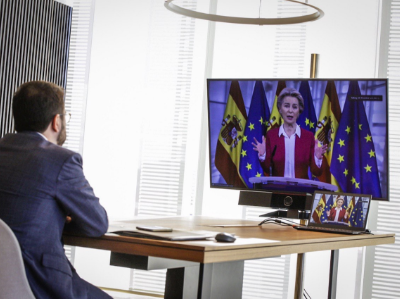- During his participation in the Conference of Presidents, he reported the "unjust disqualification" of President Torra and defended a resolution of the Catalonia-State conflict "with more democracy and no repression"
- He proposes to create a permanent forum to engage in a dialogue with the territories and the European Commission "to work together" in the management of the funds of the Next Generation Programme
- He calls on the Spanish Government for an "urgent" economic rescue plan to meet the immediate needs of the second wave of Covid-19

The Vice-President of the Government and Minister of Economy and Finance Pere Aragonès has requested for Catalonia "to manage its share of the European Recovery Fund directly, in accordance with its economic and population structure". He defended this position during his speech at the 13th Conference of Presidents, where other topics were addressed such as the distribution of resources of the Next Generation EU fund to deal with the crisis arising from Covid-19, and the President of the European Commission, Úrsula von der Leyen, was present
At the beginning of his speech, the Vice-President stressed that "Catalonia participates in the conference through its vice-president because President Quim Torra has been unfairly disqualified for requesting the release of political prisoners and the return of exiles". In this sense, he reiterated the need to resolve the political conflict between Catalonia and the institutions of the State "not with repression, but with more democracy, which is how political conflicts are resolved within the EU".
Aragonès has assessed positively the activation of the Next Generation EU Programme, but has warned that it needs to be applied "according to the principle of subsidiarity, that is, involving the citizens of the territory in the decision-making process and its execution as much as possible". In addition, he demanded that Catalan SMEs benefit directly from it, "since this project needs to go hand in hand with large corporations, but also with entrepreneurs and small and medium-sized enterprises". In order for this direct management of the fund to be carried out, the Vice-President has proposed the creation of a permanent forum of dialogue between the sub-state territories and the European Commission, with the aim of "working together in the fund management". In addition, in relation to its economic endowment, he underlined the need to exhaust the €143,000 M the State is expected to receive. "We cannot leave euros in the drawer or projects on the table; we must be able to execute them all", he insisted.
"Catalonia Has Done its Homework"
In his speech, the Vice President highlighted Catalonia's experience in the management of cross-border projects in collaboration with other European territories. With regards to the specific projects to deal with the impact of the pandemic, Aragonès assured that Catalonia "comes with the homework done, already last July the government presented the Economic Reactivation and Social Protection Plan, involving €31,700 M". The Vice-President explained the priority axes of the plan: economy for life (including health, agri-food and biotechnology sectors), digitization of the economy and society, ecological transition, boost of knowledge society, internationalization and gender perspective.
"Immediate Actions Are Needed"
Despite acknowledging the value of the Next Generation Programme as an investment "for future reconstruction and transformation", the Vice-President stressed that "we must also articulate a plan to overcome the emergencies we have today". For this reason, he requested the Spanish Government to implement an economic rescue plan to deal with the economic impact of the second wave of Covid-19. "A few days ago, I asked President Sánchez for a moratorium on tax payments and a deferral of contribution payment, but direct aid will be needed", explained the Vice-President.
"Urgent measures need to be implemented, and this requires the State, which collects taxes and determines the capacity of debt, to act. If we had their responsibilities, we would have already done it", he concluded.